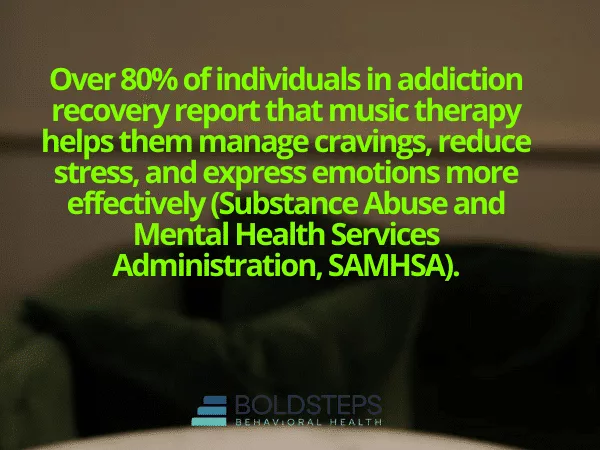Music is a universal language that transcends cultures, emotions, and experiences. Throughout history, music has been used as a tool for healing, self-expression, and emotional release. Today, music therapy is an established, evidence-based approach in mental health treatment programs, addiction recovery, and trauma healing. It provides individuals with a creative and effective way to manage stress, regulate emotions, and develop healthy coping mechanisms.
At Bold Steps Behavioral Health, we recognize the importance of holistic approaches to recovery and incorporate music therapy as part of our comprehensive Mental Health Treatment Program, Addiction Treatment Programs, and Outpatient Treatment Programs. Whether individuals are struggling with depression, anxiety, PTSD, or substance use disorders, music therapy offers a unique and transformative way to support healing and personal growth.
This in-depth guide explores the scientific benefits of music therapy, its role in mental health treatment and addiction recovery, and practical ways to integrate music into daily life.
What is Music Therapy?
Music therapy is a clinical and evidence-based practice that uses music interventions to improve emotional, cognitive, and physical health. Licensed music therapists tailor sessions to meet each individual’s needs, using activities such as:
- Listening to music to regulate emotions and enhance relaxation.
- Playing instruments to promote coordination and self-expression.
- Singing and vocalization to improve mood and confidence.
- Songwriting and lyric analysis to process emotions and gain insight.
- Guided music meditation to lower stress levels and encourage mindfulness.
Unlike simply listening to music for enjoyment, music therapy is structured and goal-oriented, designed to address specific mental health and addiction recovery needs.
How Music Therapy Supports Mental Health
Music therapy has a profound impact on the brain and emotional regulation, making it a powerful tool for treating mental health conditions. Numerous studies have shown that music therapy can:
1. Reduce Stress and Anxiety
- Music helps lower cortisol levels, the stress hormone responsible for tension and anxiety.
- Listening to calming music activates the parasympathetic nervous system, slowing heart rate and reducing physical stress.
- Guided music meditation helps regulate breathing and promote relaxation.
2. Improve Mood and Combat Depression
- Music stimulates the release of dopamine and serotonin, neurotransmitters associated with happiness and pleasure.
- Engaging in music therapy has been shown to reduce symptoms of major depressive disorder.
- Singing and rhythmic exercises help improve emotional expression and self-confidence.
3. Strengthen Emotional Processing and Communication
- Individuals struggling with verbal expression due to trauma or mental illness can use music as a non-verbal outlet.
- Writing lyrics or analyzing song meanings can help process difficult emotions and past experiences.
- Music therapy encourages self-reflection and personal insight.
4. Enhance Mindfulness and Coping Skills
- Playing instruments or singing keeps the mind engaged in the present moment, improving focus and mindfulness.
- Music-based relaxation techniques help reduce panic attacks, PTSD symptoms, and emotional distress.
5. Improve Sleep Patterns
- Research shows that listening to slow, soothing music before bed improves sleep quality.
- Music therapy helps individuals with racing thoughts and insomnia, often associated with mental health disorders.
6. Foster Social Connection and Reduce Isolation
- Group music therapy encourages teamwork, communication, and shared experiences.
- Playing or listening to music with others helps reduce feelings of loneliness and isolation.
Given its wide-ranging benefits, music therapy is an effective tool for both mental health treatment and addiction recovery.
The Role of Music Therapy in Addiction Treatment
Addiction affects both the brain and emotions, often leading to emotional dysregulation, trauma, and difficulties in self-expression. Music therapy is especially beneficial in addiction treatment programs because it helps individuals process emotions, manage cravings, and build new coping skills.
1. Reduces Cravings and Emotional Triggers
- Listening to music activates the brain’s pleasure centers, providing a healthy alternative to substance use.
- Music therapy can be used as a distraction from cravings and a tool for emotional self-soothing.
2. Supports Emotional Healing from Trauma
- Many individuals in addiction recovery have experienced past trauma. Music therapy helps them process emotions in a non-threatening way.
- Writing or analyzing song lyrics provides a safe outlet for expressing difficult experiences.
3. Enhances Traditional Therapy Approaches
- When combined with cognitive-behavioral therapy (CBT) and dialectical behavior therapy (DBT), music therapy helps individuals connect more deeply with their emotions.
- It encourages emotional expression in therapy sessions, making recovery more engaging and meaningful.
4. Encourages Positive Lifestyle Changes
- Music therapy fosters self-discipline and perseverance, key traits for addiction recovery.
- Engaging in music-related activities provides a constructive and fulfilling alternative to substance use.
5. Builds Self-Confidence and Identity
- Addiction can strip individuals of their sense of self. Music therapy helps rebuild confidence, purpose, and self-identity.
Music therapy is a powerful addition to Drug Detox Centers, Partial Hospitalization Programs (PHP), and Intensive Outpatient Programs (IOP), providing emotional healing and long-term relapse prevention strategies.
Music Therapy Techniques Used in Treatment
Music therapy sessions can include various techniques, each serving a unique therapeutic purpose. Some common methods include:
1. Guided Music Listening and Reflection
- Choosing songs that resonate with personal experiences and discussing their meanings.
- Using instrumental music to promote relaxation and focus.
2. Songwriting and Lyric Creation
- Writing lyrics to express thoughts and emotions that may be difficult to verbalize.
- Encourages self-awareness and emotional processing.
3. Playing Instruments
- Helps release tension and stress through drumming, piano, or guitar.
- Enhances coordination, discipline, and mindfulness.
4. Singing and Vocal Exercises
- Improves self-esteem and emotional release.
- Singing releases endorphins, promoting positive mood and relaxation.
5. Music-Guided Meditation
- Combines soothing music with deep breathing exercises.
- Reduces anxiety, panic attacks, and emotional distress.
These techniques are integrated into mental health and addiction treatment programs to provide individuals with a creative and healing path toward recovery.
How to Use Music as a Healing Tool in Everyday Life
Even outside of formal therapy, music can be used as a daily tool for emotional regulation and stress management. Here are some ways to incorporate music into everyday life:
1. Create a Personalized Playlist
- Build a playlist with uplifting, calming, or motivational songs.
- Use instrumental or nature sounds for meditation and relaxation.
2. Engage in Music for Mindfulness
- Play relaxing music during meditation or deep breathing exercises.
- Use rhythmic drumming or humming to promote grounding and focus.
3. Write and Reflect on Lyrics
- Journal about song lyrics that resonate with your emotions.
- Write your own lyrics to express inner thoughts.
4. Join a Music Group or Community
- Engage in music therapy groups or local music meetups.
- Playing music with others builds social connections and reduces isolation.
By using music intentionally, individuals can enhance their emotional well-being and recovery journey.
Conclusion
Music therapy is a powerful tool for mental health and addiction recovery, offering emotional healing, stress relief, and self-expression. Whether used in structured therapy programs or as part of daily self-care, music can promote relaxation, regulate emotions, and support long-term well-being.
At Bold Steps Behavioral Health, we incorporate music therapy into Mental Health Treatment Programs, Drug Detox Centers, Partial Hospitalization Programs (PHP), Intensive Outpatient Programs (IOP), and Outpatient Treatment Programs to provide individuals with a holistic approach to healing.
If you or a loved one is struggling with mental health or addiction, take the first step toward a healthier future. Call (717) 702-6335 today to learn more about our programs and how music therapy can support your recovery.
FAQ About Music Therapy & Mental Health
What is music therapy, and how does it help with mental health?
Music therapy is an evidence-based practice that uses music interventions to support emotional, cognitive, and physical health. It helps reduce stress, improve mood, enhance emotional expression, and promote relaxation, making it an effective tool in mental health treatment.
How does music therapy support addiction recovery?
Music therapy helps individuals in addiction recovery by reducing cravings, improving emotional regulation, and providing a healthy coping mechanism. It also supports trauma healing and promotes self-expression through activities like songwriting and guided music listening.
Do I need musical experience to benefit from music therapy?
No, you do not need any musical experience to participate in music therapy. The focus is on emotional expression and healing, not musical ability.
Can music therapy help with anxiety and depression?
Yes, music therapy has been shown to reduce symptoms of anxiety and depression by regulating stress hormones, increasing dopamine and serotonin levels, and encouraging emotional release.
How does music therapy fit into a mental health treatment program?
Music therapy is often integrated with traditional therapies like cognitive-behavioral therapy (CBT) and dialectical behavior therapy (DBT). It is used in Partial Hospitalization Programs (PHP), Intensive Outpatient Programs (IOP), and Outpatient Treatment Programs to enhance emotional well-being.
What types of music therapy techniques are used in treatment?
Common techniques include guided music listening, songwriting, playing instruments, singing, and music-guided meditation. These methods help individuals process emotions, manage stress, and improve overall mental health.
How can I use music in my daily life for mental health and recovery?
You can incorporate music into your routine by creating personalized playlists, practicing deep breathing with calming music, writing lyrics, or engaging in rhythmic drumming for mindfulness. Music can be a powerful self-care tool outside of formal therapy sessions.
Where can I receive music therapy as part of my treatment?
Music therapy is available at many mental health and addiction treatment centers, including Bold Steps Behavioral Health. We incorporate holistic approaches like music therapy into our Mental Health Treatment Program, Addiction Treatment Programs, and Outpatient Treatment Programs.





